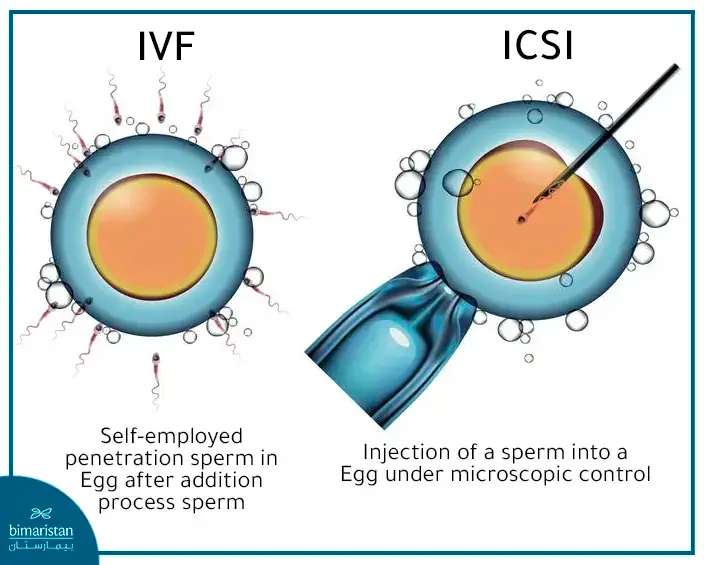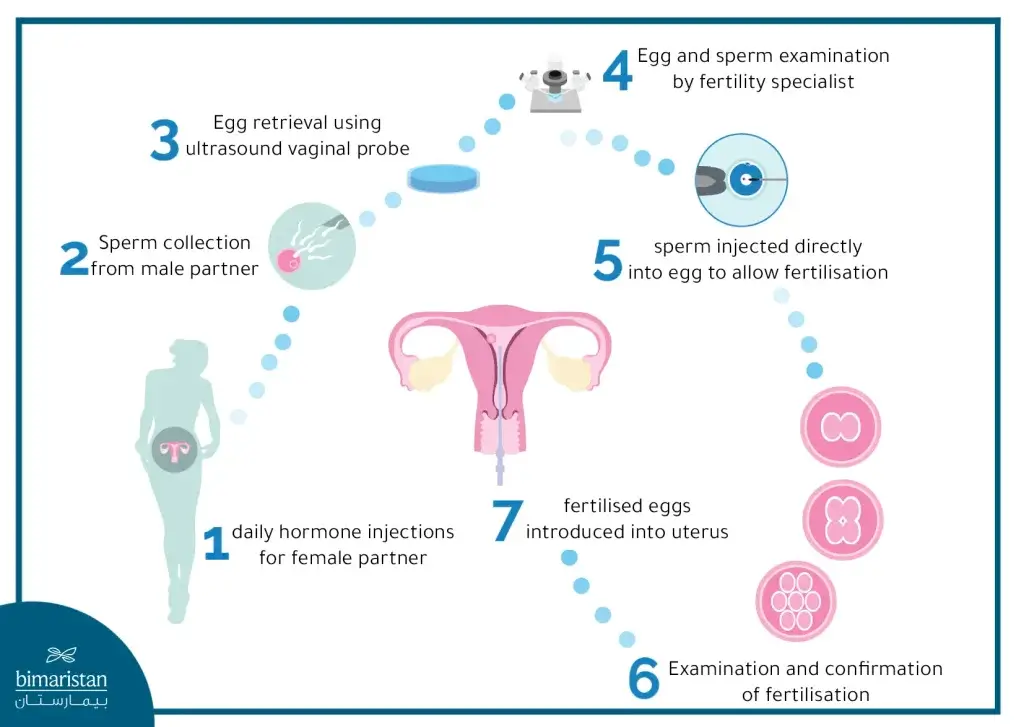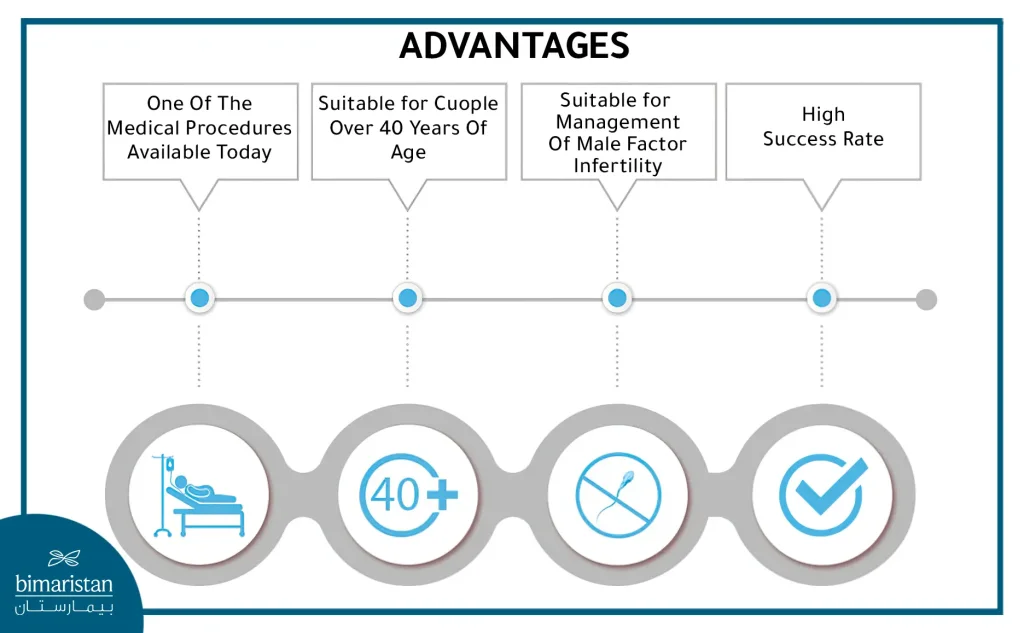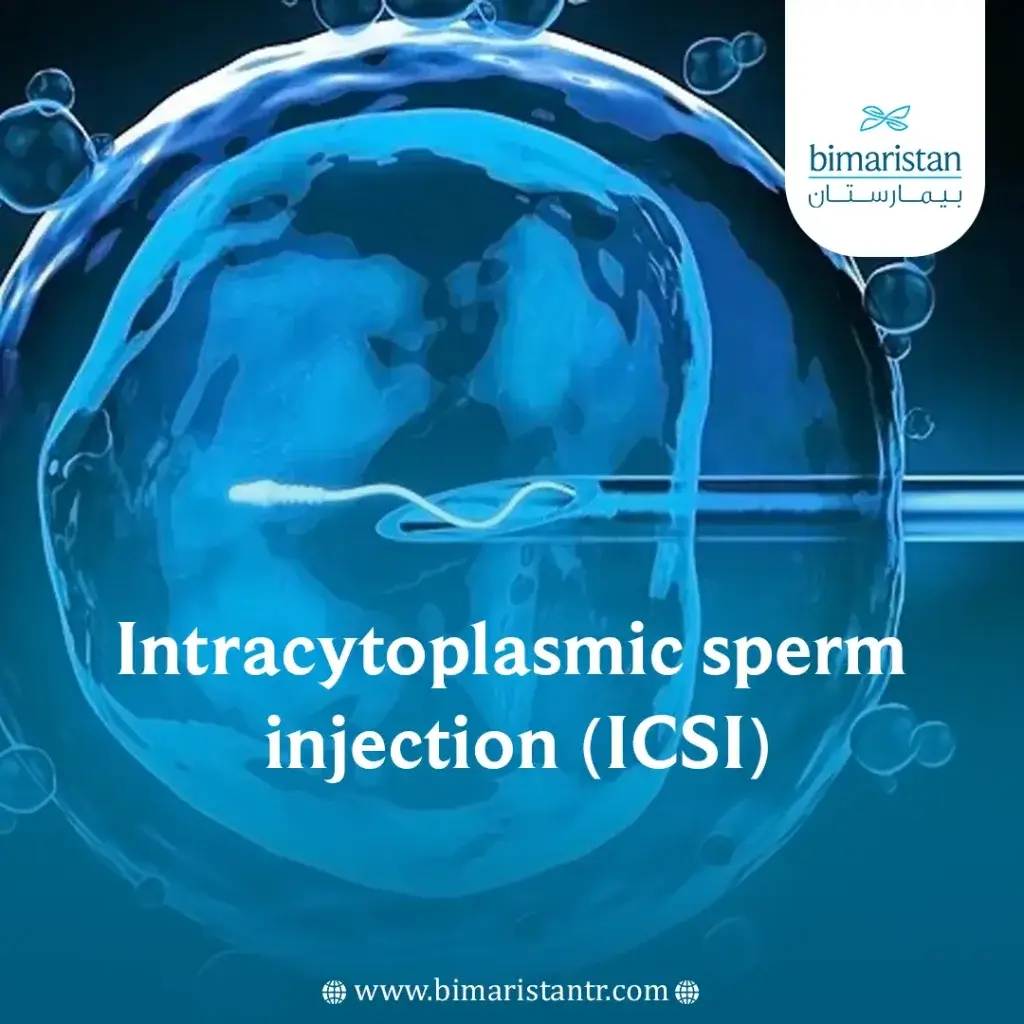Intracytoplasmic Sperm Injection is the most common and successful treatment for male infertility in Turkey. Over half of male infertility cases are associated with a low sperm count or poor sperm quality.
One in six men worldwide experiences fertility issues, often related to sperm. The trend towards Intracytoplasmic Sperm Injection has been growing, as it is a pioneering technique that has significantly transformed the success rates of conception for couples facing infertility.
Since the first reported live births using ICSI in 1992, this method has become a cornerstone in treating male infertility and overcoming the failure of traditional in vitro fertilization (IVF). Today, this procedure is used in nearly 66% of all assisted reproductive treatments worldwide and has resulted in the birth of millions of children globally.
What is Intracytoplasmic Sperm Injection?
Before a man’s sperm can fertilize a woman’s egg, the head of the sperm must attach to the outer layer of the egg. Once attached, the sperm pushes through the outer layer into the inside of the egg (cytoplasm), where fertilization occurs.
Sometimes, sperm cannot penetrate the outer layer of the egg for various reasons. The outer layer might be thick or tough, or the sperm may not be able to reach the egg. In such cases, a procedure called Intracytoplasmic Sperm Injection (ICSI) can be used alongside In Vitro Fertilization (IVF) to help fertilize the egg.
During ICSI, a single sperm is injected directly into the cytoplasm of the egg. This method allows for selecting the gender of the embryo by choosing the sperm used for fertilization based on its sex chromosome—X for a girl or Y for a boy.
Difference between ICSI, IVF, and IUI
ICSI is an advanced version of traditional IVF, commonly known as “Test Tube Babies.” In traditional IVF, the doctor places thousands of sperm next to the egg in a laboratory dish and leaves fertilization to chance. If none of the sperm fertilize the egg, pregnancy will not occur.
In contrast, ICSI facilitates fertilization by directly injecting a single sperm, carrying the desired sex and traits, into one egg in a laboratory dish. However, ICSI does not guarantee 100% fertilization.
While IVF was primarily developed to address infertility issues in women and men, this procedure specifically targets male infertility due to low sperm quality or quantity.
The ICSI procedure involves injecting a single sperm directly into the egg’s cytoplasm, bypassing the zona pellucida, which may act as a tough barrier to sperm. This increases the chances of fertilization and pregnancy regardless of the semen quality in terms of shape, count, and motility.
Intrauterine insemination (IUI) is a medical procedure aimed at improving the chances of conception by directly injecting the man’s semen into the woman’s uterus. A sample of the man’s sperm is taken and injected into the uterus during the woman’s ovulation period using a small needle.

When to consider Intracytoplasmic Sperm Injection?
Intracytoplasmic Sperm Injection (ICSI) is highly beneficial for couples experiencing male infertility. ICSI is recommended if the male partner has:
- Inability to ejaculate
- Obstruction in the male reproductive tract
- Poor sperm quality or abnormal sperm morphology
- Low sperm count, insufficient for traditional artificial insemination techniques
- Absence of sperm in the semen, where sperm samples can be extracted directly from the testes
- Difficulty for the sperm to attach to the egg
- Retrograde ejaculation (semen flowing backward into the bladder)
- Repeated failure of artificial insemination after more than three years of marriage
Round Spermatid Injection (ROSI) Technique
The Round Spermatid Injection (ROSI) technique is part of the ICSI process, used for men with a complete lack of mature sperm capable of fertilization. This involves examining immature sperm precursors, particularly those containing a round spermatid cell.
Under normal conditions, these precursor cells cannot fertilize an egg. However, the ROSI technique makes it possible for round spermatids to fertilize an egg and achieve pregnancy.
The child resulting from this technique is no different from a child conceived through ICSI, with both being structurally and mentally healthy like a naturally conceived child.
Detailed steps of the Intracytoplasmic Sperm Injection (ICSI) procedure
this procedure is typically divided into several stages:
Preparation for ICSI
Before performing this procedure, the doctor must retrieve eggs and sperm from the couple. The steps for retrieval are as follows:
- Ovarian Stimulation: The wife receives hormonal injections for 8 to 14 days to stimulate the ovaries to produce multiple eggs at once. This is followed by hCG injections to ensure the final maturation of the eggs.
- Egg Retrieval: Using transvaginal ultrasound guidance, the doctor inserts a thin needle through the vaginal wall into the ovaries. Mild anesthesia is applied, so there is no pain. The needle is connected to a suction device that collects the eggs.
- Sperm Collection: On the same day as the egg retrieval, the sperm sample is collected and must be received by the laboratory within 60 minutes of ejaculation. The husband should abstain from sexual activity (no ejaculation) for two to three days before sperm collection.
- Semen Analysis: An immediate semen analysis is performed to check sperm volume, motility, and quality, determining the appropriate ICSI method. Some men may need to have their sperm extracted surgically before the procedure.
Intracytoplasmic Sperm Injection procedure steps
The steps for injecting the sperm into the egg are as follows:
- A special tool is used to hold the mature egg in place on a lab dish.
- A single sperm is captured using a fine needle.
- The fine needle is inserted into the mature egg until it reaches the cytoplasm.
- The sperm is injected into the cytoplasm of the mature egg.
- Finally, the needle is withdrawn from the egg’s cytoplasm.

After ICSI procedure
After the ICSI procedure, the doctor monitors the fertilized egg in the lab for signs of successful fertilization. Within five to six days, a healthy fertilized egg should divide into cells and form a blastocyst. The doctor then evaluates the blastocyst’s size and cell mass to determine the best time for its transfer to the uterus to maximize the chances of pregnancy.
Embryo transfer usually occurs on the fifth or sixth day after egg retrieval. The exact timing is determined by the doctor, who will use ultrasound technology to inject the embryo into the uterus via hysteroscopy to achieve pregnancy.
The embryo needs to implant and nest in the uterus to grow and develop. The doctor may recommend waiting at least two weeks before taking a pregnancy test.
Detailed medications for ICSI
To enhance the likelihood of achieving pregnancy during this procedure, the doctor may suggest a range of medications, specifying the amount, timing, and dosage based on the couple’s individual circumstances, and then monitor the body’s response to them.
Common fertility medications used include:
- Ganirelix: This prevents the release of certain hormones (luteinizing hormone), stopping the premature release of eggs and giving them more time to grow and mature.
- Doxycycline: When taken by the male, it reduces levels of sperm bacteria that can interfere with sperm performance during this procedure. When taken by the female, it can reduce the risk of infection after egg retrieval.
- GnRH Agonists: Known as Lupron, they can stimulate the growth of multiple high-quality eggs (known as Lupron Flare) and reduce the risk of early ovulation (known as long Lupron stimulation) during the ICSI cycle.
- Gonadotropins: These stimulate small ovarian follicles to grow and mature into follicles that usually contain mature eggs. Common examples include Gonal F, Menopur, and Follistim.
- hCG/Lupron Bolus: Stimulates the final development of eggs before their retrieval.
- Progesterone: Ensures sufficient progesterone levels in the body after egg retrieval until the placenta starts producing it after the third month.
Advantages of ICSI
Compared to traditional IVF, this procedure appears to be more successful in helping males treat their infertility when the conditions for ICSI success are followed correctly. However, some centers perform this procedure for all individuals, regardless of the cause of infertility.

Reasons for ICSI Failure
Although ICSI successfully fertilizes 50% to 80% of eggs, fertilization may fail due to several reasons:
- Damage to some or all eggs during needle insertion
- Fertilization does not occur even after sperm injection
- The embryo stops growing in the lab or after embryo transfer
Risks of ICSI
There are no specific risks to the couple during this procedure, but the primary concern is the potential failure of the procedure.
In the United States, about 2% of naturally conceived children have congenital problems. An additional 1% of children conceived via ICSI experience congenital issues. Experts believe that the underlying cause of infertility may contribute to these problems rather than the treatment itself. This risk is relatively small, considering that congenital defects occur in 2% of naturally conceived newborns each year.
Some infertility problems may be genetic. For example, male children conceived using ICSI may inherit the same infertility issues as their fathers.
Cost of ICSI Procedure
The cost of this procedure varies from patient to patient depending on their condition and the specific technique used, whether ICSI is performed with or without Round Spermatid Injection (ROSI), and the necessary tests.
At Bimaristan Center, we use the best techniques and equipment tailored to the patient’s condition in collaboration with top doctors in Turkey. The starting price for this procedure is $3,500, which is modest compared to the expected cost in Europe and the USA.
Don’t worry—we care about you and your baby. Specialists at Bimaristan Center will stay in continuous contact with you until the pregnancy is fully and naturally completed to ensure the health of both the mother and the baby.
In conclusion, ICSI is closely related to the treatment of male infertility, especially since this procedure has increased the success rate of fertilization in men with unexplained infertility regardless of semen quality in terms of shape, count, and motility. If you are experiencing fertility issues, you can visit Bimaristan Center in Turkey or contact consulting doctors to explore the appropriate procedure.
Sources:
- NHS, Intra Cytoplasmic Sperm Injection
- AMERICAN SOCIETY FOR REPRODUCTIVE MEDICINE, ICSI
